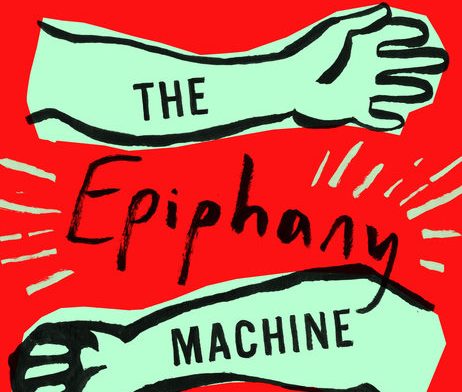interviews
Double Take: ‘The Epiphany Machine’ Takes Tragicomedy Into Terrifying New Corners
David Burr Gerrard’s second novel explores what it means to know too much about the future

“Double Take” is our literary criticism series wherein two readers tackle a highly-anticipated book’s innermost themes, successes, failures, trappings, and surprises. In this edition, frequent Electric Literature contributors Kyle Lucia Wu and Tobias Carroll discuss David Burr Gerrard’s The Epiphany Machine.

The eponymous Epiphany Machine central to David Burr Gerrard’s novel is marketed to the world with the slogan, “Everyone else knows the truth about you, now you can know it, too.” What does it actually do? It tattoos revelations to your forearms. It seems like a baffling device, little more than a cult, until people realize it actually works. The main character, Venter, is no different and falls into the drama surrounding the device and its operator, Adam Lyons. Then stuff gets even weirder.
Spoilers are encouraged and fair-warned, with the hope that readers purchase the novel and join the discussion in the comments.
Kyle Lucia Wu: So there is a lot of talk about “breastfucking” in this book. It is Epiphany Machine owner Adam Lyons’s seemingly preferred mode of sexual activity (though we never see him engaging in it, simply talking about it). He tries to argue at one point that it is a perfect form of sexual interaction, and Venter, the main character, points out that there is no pleasure for the woman in breastfucking. What do you think this says about Adam? That he’s only concerned in singular pleasure, not mutual? Something Oedipal?
Tobias Carroll: I’d like to say that that’s par for the course for Adam, who seems paradoxical from the start and keeps adding contradictory aspects as the book proceeds. He’s deeply committed to the workings of the Machine and is decidedly principled about it; yet, by the end of the novel, it’s revealed that (mild spoilers, though I’ll try to be vague) his precise ethical standards have a couple of significant exceptions.
So maybe “breastfucking” is something of a reflection of this. It is, in the words of Deadwood, ”A lie agreed upon.” Or something emblematic of Adam’s successful attempts to convince himself that, no, this is totally mutually pleasurable for all involved, when in reality, it’s not.
“We can’t just know a little bit. We need to know everything.”
I suppose that circles around to one of the big questions of the book: Did you walk away with the impression that the Epiphany Machine did more harm than good? I keep going back and forth on this question, which is a pretty great representation of the layers on which the novel works. Is the Machine, ultimately, a force for ill? Is it more of a relic of a bygone era that no longer has a place in this century? It’s a pretty powerful symbol — even as its role in a relatively realistic novel borders on the metafictional. Layers on top of layers.
KLW: I do think it does more harm than good ultimately, but not in a malicious way. There’s a limit to what we should know about each other, and a point where knowing the truth is no longer useful. It reminds me of the Black Mirror episode, “The Entire History of You,” where everyone has video chips in their heads that record their memories to the point where we can replay any interaction for ourselves or others. Of course there’s reasons why this might be helpful — what exactly did my boss ask me for when I wasn’t listening? — or just replaying a certain memory — but it’s very easy to see how downhill it could and would go. Suddenly you can’t trust anyone’s retelling of their memory unless they play you the exact video so you can see for yourself. The Epiphany Machine is the same.
In the beginning of the book, having an epiphany tattoo is looked down upon and thought to be part of a cult. Then they start to be interesting, maybe personally revealing: Lots of people don’t know themselves, so it becomes pretty alluring to be able to be told the truth about yourself without all that pesky self-investigation. By the end of the book, they’re largely required. The problem is that with any kind of illumination like this, I don’t think humanity can handle only having it in small doses. We can’t just know a little bit. We need to know everything.
In the end, it’s brought up that political pundits have suggested the next presidential candidates must get epiphany tattoos and show them on the debate stage. It might be interesting to imagine what 45’s might have been. But a good point this brings up is: Would it even matter? If we all get used to seeing so much truth, would seeing the bad truths become normalized?
TC: The morning I’m typing this, 45 has tweeted a video in which he assaults a wrestler with the CNN logo for a face, so–as much as I’d like to think it could make a difference, I suspect it would be normalized. Though I’d also love to see what epiphany tattoo attack ads would look like. Maybe “love” is too strong of a word: I’d be morbidly curious to witness it in an alternate world, but I’d be terrified about it in this one.
Talking politics also calls to mind Gerrard’s first novel, Short Century, which also engaged with a host of political issues, albeit in a very different way. It, too, had subplots about alter egos–which means that we might be getting into to the realm of preferred authorial themes. Did you find any areas in which the two books overlapped?
“It should also be said that Gerrard is committed to giving us flawed, potentially unlikeable narrators at the forefront of each of his books, something I love.”
KLW: I love digging into an author’s preoccupations. I see a lot of parallels with Short Century and The Epiphany Machine: a lot politics, a lot of anger, and a lot of talk about persuasion. I think Short Century tells its story with more rage. The Epiphany Machine is told more passively, because of its very different narrator. Venter’s opinions are fairly changeable and muted — after all, he is very dependent on the opinion of others. In Short Century, the narrator, Arthur, seems to strongly believe that he understands others better than they understand themselves — he’s very confident in his own empathy. Now that I’m saying that, it sounds like the idea behind the Epiphany Machine. “It knows you better than you know yourself!” Maybe there is something that connects empathy and epiphanies. It could be argued they are there so you can feel empathy with yourself: Once you know your biggest secret, you can accept it. Or is it to feel empathy with others, by having them reveal their biggest flaw upfront?
It should also be said that Gerrard is committed to giving us flawed, potentially unlikeable narrators at the forefront of each of his books, something I love.
Also — incest? At the forefront of Short Century is the reveal of the narrator’s incestuous relationship with his sister. There isn’t any incest in The Epiphany Machine, but I do think that the way he blurs the lines between Adam, Rose, Venter, and Isaac does mar the traditional familial lines, and points to a preoccupation of boundaries in families.
TC: I absolutely agree with you on that. I also don’t think it’s coincidental that both of Venter’s father figures have names that are pretty loaded with Old Testament connotations: Adam as this primal father figure (which he succeeds at with respect to the Machine, but is less successful at with actual people), and Isaac, whose paternal role ends up being more pronounced with trying to help Ismail than with Venter. I don’t know. It very much seems in keeping with a novel about people being literally assigned roles and stations in society and wrestling with whether or not to live up to those.
Double Take: Dan Chaon’s ‘Ill Will’ is the Darkest Novel You’ll Read This Year
KLW: That’s a great point that parallels with the epiphany tattoos themselves. Once they get it on their forearms, they then have to decide whether they are going to keep fulfilling their tattoo or whether they’ll go against it. I mean, Isaac’s tattoo was should never become a father, and he deliberately became one.
“Once you know your biggest secret, you can accept it.”
How do you feel about the use of history (9/11) or real people (John Lennon)? I’m not a huge Beatles fan and John Lennon doesn’t hold much personal significance to me, but I was wondering how I’d feel if it had been about a musician I feel close to in my head. Do you think the choice to use a famous person in a narrative is risky because it may anger or alienate readers, or do you think it’s smart because readers already have an investment in this character?
TC: I think it works in the case of Lennon in a way that it might not have with, say, George Harrison. Some of it might be that (especially in recent years) Lennon has emerged as a much more flawed pop cultural figure — the fact that we can discuss him being abusive, for instance. And the fact that his killing has also (like it or not) become somewhat mythologized–I’m thinking back to the movie from a few years ago where Jared Leto played Mark David Chapman, and (if memory serves) Salman Rushdie’s The Ground Beneath Her Feet also contained a fictionalized riff on Lennon’s death. Tying the Epiphany Machine to the Beatles, and making it a sort of magical-realist distillation of a certain aspect of Boomer culture, clicked for me.
The point at which the book began to focus more on the abuses of the US post-9/11 took a little bit of time for me to process–a sense of, “Oh, this is where this is going.” That’s a little more immediate for me: I was living in New York at the time, and I think I’m always going to have a complex relationship to descriptions of that event, and that point in time, in fiction.
“I’d be terrified to get an epiphany tattoo IRL.”
That said, the way the Epiphany Machine leapt from cult Boomer relic to adjacent to American paranoia ultimately worked for me–it was something of a narrative leap, but it clicked. And the section about two-thirds of the way through, where nearly every epiphany ends with but is stronger than terrorists seemed like a perfect (and unsettling) evocation of the early years of the Bush presidency.
…though I was also impressed with how that section threw a whole lot of ambiguity into the narrative about whether the Machine was actually doing Adam’s bidding or if it was genuinely tapping into the user’s subconscious–or some sort of collective unconscious.
KLW: That’s a very interesting point that was never clarified. If Adam’s not in control of the machine, how would he possibly fix that on every arm? I tend to think it’s pointing to the way our collective unconscious wraps its arms around a certain idea.
There’s a point that’s glossed over around the middle of the book where Venter refers to thinking as a drug. “Thinking, like any other drug, can be a useful distraction from pain.” I think that’s actually a large part of this book, that thought is a kind of danger the way a drug is.
TC: And it also goes into Gerrard’s running concern over the dangers of ideological extremism, the characters who are seduced into acting on behalf of abusive governments in both of his novels tend to have thought way too hard about things, and end up causing abundant harm for others as well as corrupting themselves…
KLW: Several sections of this book deal with Stephen Merdula’s fake book that has several different explanations for how the Epiphany Machine came to be (thereby making all of them void). Several of them are also the testimonials that Venter takes from people who have used the epiphany machine. I loved the testimonials from people and found them pretty fascinating, especially because they’re often not at all objective — they believe in their epiphanies or don’t, and that shows completely in their storytelling. They’re saying “It changed my life!” or “It changed nothing” — completely skewed by their own opinions. How effective did you think these interludes were in the narrative?
TC: It clicked for me. Ultimately, this was a novel that was set in a world pretty close to our own, but with a very slight dose of surrealism. But for the Epiphany Machine to work and not just feel like a decidedly clever symbol or narrative device, getting a sense of how it might fit into people’s daily lives makes a lot of sense to me.
I can also say that, having thought about this a fair amount since finishing the book, I’d be terrified to get an epiphany tattoo IRL.
KLW: I think I’d be wildly curious about what mine would say, but not brave/reckless enough to have it embedded in my arm.
TC: Am I crazy for seeing Adam Lyons as a weird fictional analogue for Michael Seidenberg of Brazenhead Books? (Which I suppose would also make this slightly-alternate New York a close cousin to the slightly-alternate New York of Jonathan Lethem’s Chronic City, which I’m totally in favor of.)
KLW: I love that reading of Adam. I think Adam is a bit more of an antihero than Michael, but there seem to be parallels in personality and in their business models (both more interested in spreading wisdom than gaining money). And the Upper East Side apartment. (And wasn’t Jonathan Lethem one of Brazenhead’s first Brooklyn employees?) This is a wonderful reading of Adam’s shop for many reasons.
A brazen head historically was an automaton, a brass head that could speak to its owner and answer his questions — a magical object that somehow knew more than the humans it was interacting with. The epiphany machine is a perfect, albeit more aggressive and permanent stand-in for that. There were always dangers to a brazen head, whether it reflected hubris, allowed you to misinterpret the answers, or maybe just told you too much about yourself — and this certainly falls in line with the theme of thinking or knowledge as a drug. There is a danger to knowing your epiphany through this machine, many layers of danger in fact, just one of them being that everyone can read it on your skin.
TC: Over the course of the novel, Venter moves from an enthusiastic acolyte of Adam’s work to a more oppositional role–to borrow the essential punk term, he’s pretty much a corporate sellout. And he betrays his best friend in a pretty horrific fashion. So I’m curious: Do you think the narrative lets him off too easily by the end? To an extent, it seems like Ismail needs to suffer for Venter to have a more genuine epiphany; on the other hand, this is a novel with a premise and structure that question the role of epiphanies.
KLW: That’s a very good question that I struggled with as well. Does Venter deserve to end up with Rebecca in the end, and baby Rose? Does he deserve to have his parents reunited, arguably the most common fantasy among young children whose parents are separated? What he does to Ismail seems like such a betrayal not least because Venter seems to know in his heart that Ismail is innocent, though he does go back and forth about what he knows to be true and what he has convinced himself to be true.
I think the fact that his loyalties seem to sway so wildly (and we see this with all his primary relationships in the book: Rebecca, Ismail, Adam, his father) is just another indicator that Venter genuinely doesn’t know how to think for himself, what his epiphany predicted, but his epiphany just made him more uncertain. Sometimes he tries to push against his epiphany just because he knows he has it, but this backfires as well.
Do you think that this book is arguing for epiphanies or against epiphanies? I think an epiphany is another thing we can clutch onto for some sense of identity, the kind a job or any role in society can provide. But anything we hold onto too tightly like this, anything we expect to get all the answers from, ends up being way more of a crutch than anything else. It’s dangerous to believe too sturdily in almost anything — even, or especially, something about yourself.
TC: I’d go in the “against” camp, myself. Nearly every prominent character who gets a tattoo ends up regretting it. Ismail’s tattoo destroys his life; Venter’s provides a means by which authority figures can manipulate him and by which he can hold off on taking responsibility for his own actions. Epiphanies seem to me to be best when they’re temporary: That great insight you have about yourself one day might no longer apply to the person you are a month later, and trying to cling to that is like a more sophisticated version of wearing your high school varsity jacket when you’re pushing 30. (Or 40, or 50.) It’s essentially arguing that, on a fundamental level, you’ll never change from the person you were when you had that realization–which is a deeply dangerous proposition.








